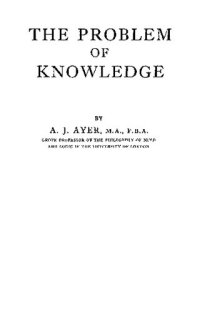
Ebook: The Problem of Knowledge
Author: Alfred Jules Ayer
- Tags: logical-positivism
- Publisher: Macmillan
- Language: English
- pdf
In The Problem of Knowledge (1956), Ayer defended a context-based account of knowledge that had as its essential ingredients that some claim, p, counted as knowledge for a person, A, iff p was true, A was sure that p, and A had, in the relevant context, ‘the right to be sure’ about the truth of p. The contextual element is apparent in the discussion after Ayer outlines what is required to have the ‘right to be sure’ in the mathematical case. One avenue to knowledge in this case lies in the ability of the agent to provide a proof of the relevant proposition. In the case of perception, or memory, it is clear that it is impossible to possess such a proof, so a more relaxed standard is required. To state in general how strong the backing needs to be for a believer to have the right to be sure that their belief is true is not possible; doing so would require drawing up a list of conditions “under which perception, or memory, or testimony, or other forms of evidence are reliable.” (1956, p. 32.) Ayer thought this would be too complicated a task, if at all possible. The ‘correct’ standard to set for claims to knowledge is to be decided pragmatically, on grounds of practical convenience. The skeptic’s ploy of setting an impossible standard, one requiring the impossibility of error, should be resisted, as one has the right to be sure even where error is possible.
Download the book The Problem of Knowledge for free or read online
Continue reading on any device:

Last viewed books
Related books
{related-news}
Comments (0)